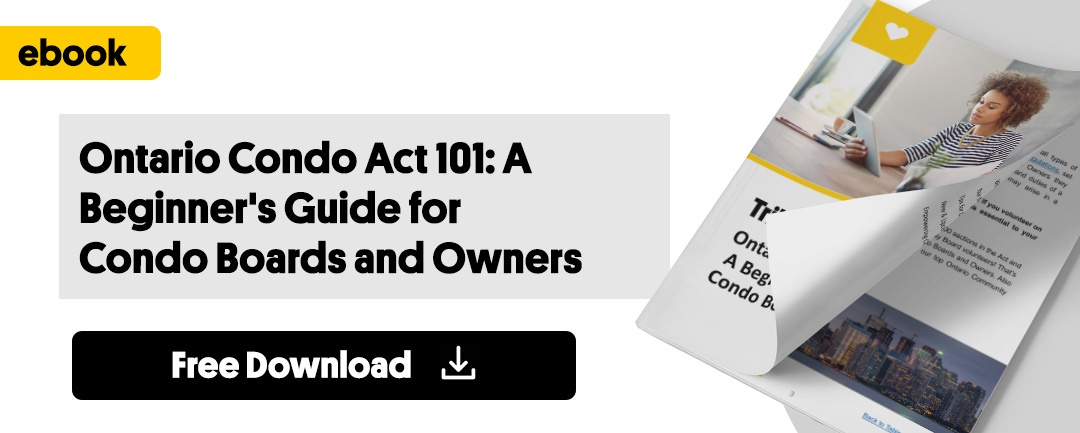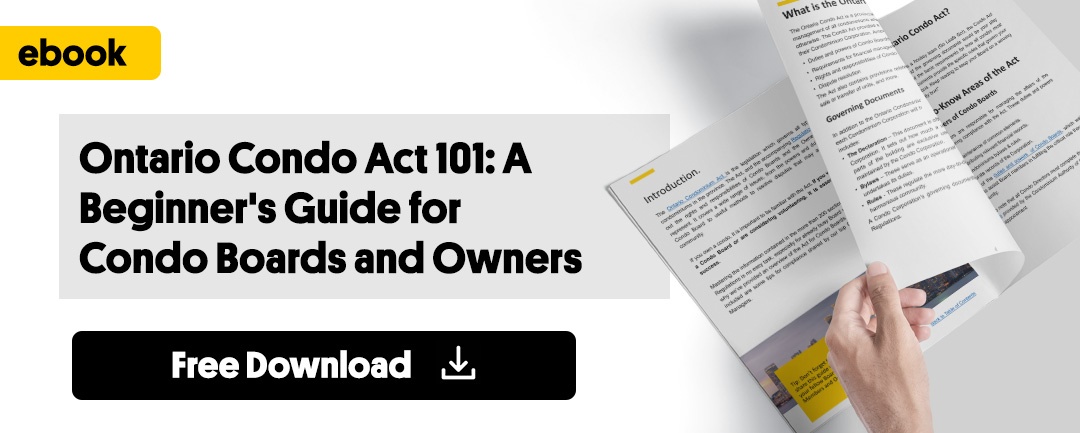
Ontario Condo Act 101: A Beginner's Guide for Condo Boards and Owners
The Ontario Condominium Act is the legislation that governs all types of condominiums in the province. The Act, and the accompanying Regulations, set out the rights and responsibilities of Condo Boards and the Owners they represent. It covers a wide range of issues, from the powers and duties of a Condo Board to useful methods to resolve disputes that may arise in a community.
If you own a condo, it is important to be familiar with the Act. If you volunteer on a Condo Board or are considering volunteering, it is essential to your success.
Mastering the information contained in the more than 200 sections in the Act and Regulations is no easy task, especially for already busy Board volunteers! That’s why we’ve provided an overview of the Act for Condo Boards and Owners. Also included are some tips for compliance shared by our top Ontario Community Managers.
Table of Contents
What is the Ontario Condo Act?
The Ontario Condo Act is a provincial law that governs the creation, operation, and management of all condominiums whether leasehold, freehold, standard, phased or otherwise. The Condo Act provides a legal framework that allows Owners to govern their Condominium Corporation. Amongst other provisions, the Act sets out the:
- Duties and powers of condo boards
- Requirements for financial management & reporting
- Rights and responsibilities of condo owners
- Dispute Resolution
The Act also contains provisions related to insurance, repairs, leasing of units, the sale or transfer of units, and more.
Governing Documents
In addition to the Ontario Condominium Act, 1998 and the Condo Act Regulations, each Condominium Corporation will have a unique set of governing documents that includes:
- The Declaration – This document is often considered the constitution of a Condo Corporation. It sets out how much a unit will pay in common expenses, what parts of the building are exclusive use common areas, and what items are maintained by the Condo Corporation.
- Bylaws – These serve as an operational manual and detail how a Condo Board undertakes its duties.
- Rules - These regulate the day-to-day aspects of condo living to ensure a harmonious community.
“If you think of your Board as a hockey team (Go Leafs Go!), the Condo Act would be your rule book and the governing documents would be your playbook. While the Act sets out the basic requirements for how all condos must operate, your governing documents provide the specific rules that govern your condo’s day-to-day operations. Keep reading to keep your Board on a winning streak and out of the penalty box!”
Need-to-Know Areas of the Act
Duties & Powers of Condo Boards
The Board of Directors are responsible for managing the affairs of the Corporation and ensuring compliance with the Act. These duties and powers include:
- Overseeing the maintenance of common elements.
- Preparing and distributing relevant financial records.
- Enforcing the Condominiums bylaws & rules.
- Maintaining accurate records of the Corporation.
This is just some of the duties and powers of Condo Boards, which we’ve covered in-depth to assist Board members in fulfilling the critical role they have within their community.
It is important to note that all Condo Directors must complete the foundational training program provided by the Condominium Authority of Ontario within six months of their appointment.
Rights and Responsibilities of Condo Owners
Every Owner contributes to the Corporation's smooth and efficient operation. This involves:
-
Voting at annual general meetings (AGMs)
-
Maintaining your Unit
-
Fulfilling your obligation to pay common expenses (or condo fees)
Psst…check out our article "What do Condo Fees Cover” for the answers to frequently asked questions about condominium budgets and common expenses.
Dispute Resolution
Disputes can sometimes be unavoidable. Minor disagreements can typically be resolved with prompt and clear communication however parties may agree to mediation or arbitration. For serious or unresolvable issues, the Board (or an Owner) may file a dispute with the Condominium Authority of Ontario (CAO). The CAO handles disagreements online through the Condominium Authority Tribunal.
Insurance
Under the Ontario Condo Act, Condo Corporations must have insurance coverage for:
-
Property: Covers damage to Units and common elements from fire, hail, windstorms, etc.
-
Liability: Protects the Corporation, the Board, and its agents against claims related to personal injury or property damage on common elements or due to the Corporation's activities.
The Act also outlines circumstances where an Owner may be held liable for an insurance deductible.
Condo insurance is a complicated subject. To demystify it, our Community Managers work closely with an Insurance Broker and the Board to ensure that your Corporation has the necessary coverage at the best price.
Financial Management
The Condo Act sets out several areas of financial management that a Board of Directors must oversee. These include:
-
Annual Budget – Prepare and approved yearly, a budget must be provided to Owners at least 15 days prior to its implementation. We’ve covered the breakdown of budgets and what you should know previously if you’re unsure where to start.
-
Reserve Fund – This account is maintained for any major repairs or replacements of common elements such as elevators, roofs, and boilers. A reserve fund study must be done at least every 3 years.
-
Audit – A Condominium Corporation’s yearly audit report must be completed then delivered and presented to Owners.
In addition to the above the Act also provides rules for levying common expenses, collecting arrears and investment of Corporation funds.

Tips for Compliance
Now that we’ve gone over some key parts of the Act for Owners and Condo Boards, you might be wondering, can our Board do it all? Undoubtedly being on the Board can be a tough job sometimes. However, we’ve compiled some helpful tips below to assist you and your fellow Board members:
Keep accurate records
It is important to keep detailed documentation of all financial transactions and decisions made by your Board. This includes maintaining accurate minutes of meetings, keeping track of all income and expenses, and keeping copies of all documents related to the Corporation. At Tribe, our clients utilize our Community Platform Tribe Home.
Hold regular meetings
While the Act does not specify how often Board meetings should occur, regular meetings ensure accountability and transparency within the Community. In addition to the election of the Board, properly held Annual General Meetings (AGM) allow for important discussions about your community’s financial health and ongoing projects.
Follow proper procedures for voting and decision-making
The Act provides different methods for passing resolutions, depending on the type of motion and the size of the Corporation. It is important for your Condo Board to ensure all decisions are made fairly and in accordance with the Act.
Seek legal advice if necessary
If you have any questions or concerns about your obligations under the Act, it may be helpful to obtain a legal opinion. A lawyer can provide guidance on the Act and how different sections have been interpreted in court.
Engage a property management company
While your Board is ultimately responsible for making decisions, a Condominium Manager can assist with day-to-day tasks. In Ontario, Condominium Managers must hold a license with the Condominium Management Regulatory Authority of Ontario. This requirement was established by the Condominium Management Services Act, 2015.
New & Upcoming Changes to the Condominium Act (1998)
“Bill 91, Less Red Tape, Stronger Economy Act, 2023” received royal assent on June 9th, 2023 and the included amendments to the Condo Act took effect October 1st, 2023. With these changes, Ontario Condo Boards and Owners will be able to fully integrate hybrid business practices into their operations. Some highlights of the changes are:
- Condominium Corporations can continue holding meetings and votes virtually without the need to alter their bylaws.
- Condo Boards are able to hold meetings virtually provided a majority of the Directors agree.
Empowering Condo Boards & Owners in Ontario
The Ontario Condominium Act plays a crucial role in guiding both Condo Boards and Owners in the roles they play within their community. By adhering to this comprehensive legislation, a Board can ensure a well-managed condo and foster a thriving community.
At Tribe, our goal is to provide information, education, and support to Condo Owners and Boards throughout Ontario. Through the creation of informative content, we aspire to improve the understanding of condos for everyone. This is all part of our mission to deliver Community Management with Heart and one of the reasons we’re different from other Property Management Companies.





.png?width=352&name=Blog_Featured%20Image_Template_TB84%20(1).png)